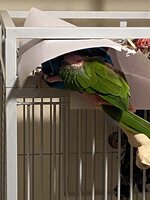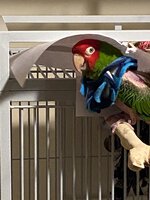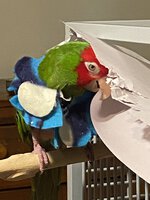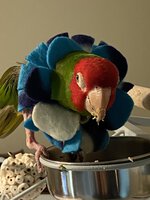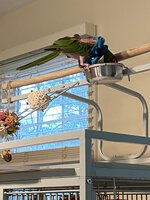As some of you know, I have adopted a CH Conure who has a history of feather plucking (naked except for wings, tail, and head), and began to injure his own chest about 2.5 weeks before my final adoption. I took him to the vet this past Tuesday, and am waiting the lab results. At that time, the vet placed a soft, petal collar on him to keep him away from his chest. He is hormonal and frequently cage aggressive. He is currently a no-touch bird as in he is not tame to step up or allow me to handle him without toweling.
Since then, he's been so angry at the collar, at how it keeps him from holding food in his foot, keeps him from picking at himself, keeps him from being sure of where he is placing his feet. Trimming the collar might help, but it would probably allow him to get at his chest again.
I have many chewing and shredding toys in his cage. I have tried to begin target training, which went OK yesterday, but not at all today. I play music for him and have tried to spend time in the room with him, but I have to work and have 3 other birds who need my attention, too.
I guess what I'm hoping is that someone can share their experience bringing home a special needs bird and what helped the bird to settle in? We're just not having a good day

Also, for those of you with birds who wear collars, how often do you change and wash them? I'm sure I need to buy several collars.
Please help with any tips you have!!

